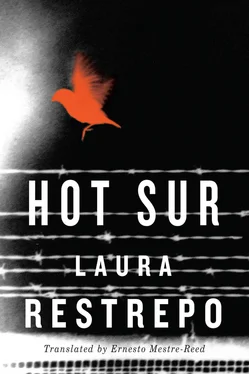“In Spanish, it is Danubio?”
“Ah yes, el Danubio. Greg spoke to me about that river, but for him, it is called the Dunaj.”
“Don’t listen to him. Your husband was a Slovak, that’s why he called it the Dunaj. The river is called the Danube and your husband is dead; they killed him.”
I change the topic immediately. They’re saying that Greg was killed on the night of his birthday, but I don’t believe it. If they also say that I did it, and I didn’t do it, how am I supposed to believe them?
Hey, Mandra, that Danubio, or Dunaj, or Danube, that runs down your back and goes all the way down there? Does it go up your asshole? Is that where it empties? And inside, do the waters of that river find beds in your veins? I’d like to ask her, but I don’t dare because if she gets angry she can flatten me with a single blow.
There I go on a tangent again. What I want to finish telling you, Mr. Rose, is what happened that day in the dining room. The others kept their distance, as if they had decided beforehand that they’d gather in a circle around me.
I was the reason for this possible melee, that was as clear as day, but I wasn’t sure why. I felt dizzy and things went blurry. Have you ever been about to faint? Well, those were my symptoms. That’s how I felt. I thought I was going to fall. I’m going to fall right here and they’re going to kick the shit out of me. No, don’t fall, goddamn it, I ordered myself, no matter what, don’t fall. As I advanced, the crowd of women opened the way before me. I put away my tray in that silence that precedes any great blow. But the blow didn’t come. As I passed by the bench where I had been sitting, I realized it was empty. My tablemates had disappeared and in the place where I had been there was a pool of blood. Fuck, they stabbed me and I didn’t even notice was the first thing I thought. They must have struck me with something, a makeshift knife, a blade, something so sharp I didn’t even feel it. I passed my hand behind me and realized my uniform was soaked in a warm liquid. I looked at my hand and it was red. The hemorrhaging. No one had stabbed me; the blood was coming out of me on its own.
Have you ever seen on TV how sharks go into an attack frenzy at the scent of blood? Well, here in prison, it’s the opposite. At the sight of blood, the instinct is to move away and remain as far away as possible. Me, alone with my blood and the others looking at me in disgust. And at that moment, who do you think shows up? The one they called Mandra X. At that time I thought of her as a kind of monster. She appears at my back and begins to walk behind me. And we left the dining room like that, me in front and her behind me, hiding my stained clothes from the others.
Maybe it’d be good to join her group, if they even accept me, or who knows what kind of favor I have to do in return, I thought when the fright had passed. Strange, my own blood made me a target and protected me. The reason? The horror most prisoners and guards feel at the blood of another. In this place that boils over with violence, where the inhuman rules, there’s nothing that causes so much dread as the sight of human blood. These women have lived through everything. There’s not a horror that’s unknown to them; the streets have initiated them under the worst circumstances, and what they haven’t learned about out there, they learn in here. They tolerate all sorts of filth, the vomit of drunks, the piss of the incontinent, the miserliness of beggars, prostitution inside the jail. Here, any disgusting thing is acceptable; filth is law. And rudeness, bad words, filthy talk, threats, insults, aggressions, lunacy, screams — everything is tolerable except blood. The blood of others is taboo. One single drop of blood is enough to become infected. But blood doesn’t appear drop by drop — it puddles in the middle of the yard or in hallways. Everyone has pints of possibly contaminated blood inside them, and it is the law to carry it protected inside the body. It is up to individuals if they’re consumed by their infections, their problem, nobody else’s business, as long as they don’t go around spreading infection. The plague is in the blood. In Manninpox, that’s what they call AIDS: the plague. They call it by its true name instead of disguising it in an acronym. So I inspire hatred but also fear; my blood is killing me, but it also protects me.
I realize that Mandra X has begun to sing a song called “Moonlight” with the voice of a man: “I want the moonlight for my sad nights.” Apparently it’s a sort of lesbian anthem, and since Mandra gives it a certain depth, everyone who listens to her sing it suddenly wants to be hugged. Some cry because the song reminds them there is a moon. We never see it here; by the time it comes out, we have long been locked in our cells.
Now I’m in solitary confinement again, with no way of knowing if it’s rainy or sunny out, if it’s day or night. Time only exists in the round clock that glares at me from the end of the hallway, and which may as well not be there, because nothing changes, everything is repeated, so what good is it to consult it? Better just to let it go around and around, because here time doesn’t exist, it’s no good for anything, time is only waiting for something that never comes. You might say that here time runs backward, toward the past, and that it is not the minutes that pass but memories.
All the memories pile in my cell, taking over my space, sucking in my air, stealing my peace. I either rid myself of them or get out and leave them there. Here in Manninpox, I have been forced to change, change so much that I have become another person. I’m not sure if better or worse, but certainly different. So what do I do with the hordes of memories of that other María Paz? In what corner of my mind do I keep them? Where do they fit? How should they be classified?
I’m referring, for example, to the memory of the day that Bolivia finally called for us to come to America. She had in her pocket that magic object we had yearned for, that passport to happiness called the green card, which when it comes down to it is not even green, but which these days is the Holy Grail. Years later, she told me how she had been able to get it, that greencita card of her soul. They gave her a Tuesday appointment and it took her hours to get ready. She bathed with her Heno de Pravia, put on her makeup more carefully than usual, dabbed perfume behind her ears and on the inside of her wrists where the pulse beats. She, who was full-figured and flashy, put on a tight V-neck sweater, letting her cleavage show a bit. Yes sir, my mother was short but voluptuous, something she always put to good use. Bolivia used her body to get ahead in America. She’d never admit that, but I knew it. Knew it and learned it from her, and I can tell you that I was an excellent student. She had a saying, “Necessity has the face of a dog.” I suppose that’s what I am, a dog who does what she can to survive, nothing more than that, or less. Why spin it? The truth is that whoever comes to America has to fight to the death and is good and fucked if she doesn’t use all the tools at her disposal. Bolivia did it. Holly Golightly did it. Why shouldn’t I do it? And speaking of, Mr. Rose, I have a question I never got to ask you about Holly. I’d like you to tell me plainly who she was. Sally Tomato’s lover, an escort, or simply a whore? Or maybe all three at once?
When Bolivia had a stable enough job, she put all her energies into legalizing her situation. She pulled together the thousand dollars she needed for the lawyer, and after a lot of paperwork and formalities, she finally had the letter to present herself. For months she had prepared herself mentally for this ultimate test, studying, reading, memorizing the list of US presidents and their first ladies, the ten amendments of the Bill of Rights, the fifty states of the Union and their capitals, the location and languages of the seven commonwealths and territories, and I don’t know how many other things that someone said they’d ask her. And in the end, they didn’t ask her. But there was one little detail about the meeting that should be mentioned. Before coming to America, Bolivia had been a fan and follower of Regina Once, a Colombian spiritual and political guide whom my mother found admirable, who had incredible powers, and was a master of many sciences. This Regina Once was a swindler in my opinion. She controlled people by the way she looked at them and made them vote for public causes she supported, using a strategy she called “running the lights.” Running the lights of a person consisted of looking at them intently, but not in the eyes, that was the key, because as she said to her students, looks cancel each other out. If you stare at someone and the other person stares back at you, the whole thing is a draw. That’s why the more effective technique is to fix your gaze right between their eyes, to overwhelm them with your power and make them do your will. From the moment Bolivia sat across from the immigration official, she fixed her eyes on the spot between his eyes, as Regina Once had taught her. She ran the lights on him, to nail him and win him over to her cause, because he had a folder with all her information in his hand, and on him depended the yes or no that would decide her fate and the fate of her daughters as well.
Читать дальше












